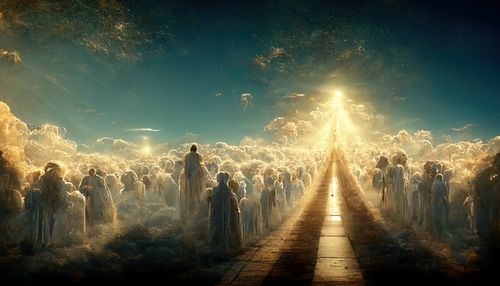 Humans have always been fascinated by what happens after death, and it's not at all surprising. After all, no one truly knows what happens when they die until they are, well, dead. And it's not exactly like they can come back and share it! This curiosity has given birth to many beliefs and narratives surrounding the afterlife. Diving deep into the teachings of various religions offers insights into how different cultures envision the world beyond.
Humans have always been fascinated by what happens after death, and it's not at all surprising. After all, no one truly knows what happens when they die until they are, well, dead. And it's not exactly like they can come back and share it! This curiosity has given birth to many beliefs and narratives surrounding the afterlife. Diving deep into the teachings of various religions offers insights into how different cultures envision the world beyond.
1. Christianity
Christianity provides a clear distinction between heaven and hell. Christians portray heaven as a paradise where souls who have accepted Jesus Christ can exist eternally with God. In stark contrast, hell stands as a cautionary destination. It is reserved for souls who have strayed from the path of righteousness and have not sought redemption. Within Christianity, the final resting place of a soul is contingent upon faith.
2. Islam
Islamic teachings, too, present a dualistic vision of the afterlife: heaven, or "Jannah", and hell, "Jahannam." Those who lived under the Quran, maintained faith in Allah, and performed commendable deeds find solace in Jannah—a place full of peace and beauty. Conversely, with its punitive ambiance, Jahannam awaits those who defy God's teachings.
3. Hinduism
Distinct from the previous religions, Hinduism introduced a different concept. This is known as "samsara," the ceaseless cycle of birth, death, and rebirth. In a current life, one's actions, or karma, impact the conditions and status of the next life. The goal is to meet moksha, which signifies a soul's freedom from this recurring cycle, ushering it into eternal tranquility.
4. Buddhism
Buddhism also acknowledges the cycle of samsara. Yet, the end goal here is nirvana, a state that ceases all suffering and desires. This marks the end of the samsaric cycle. To reach this state, followers are encouraged to follow the Eightfold Path, which encompasses profound truths about life combined with practices like kindness, mindfulness, and proper conduct.
5. Judaism
Within Judaism, the perspectives on the afterlife are diverse and multifaceted. While certain scriptures do touch upon the existence of heaven ("Gan Eden") and hell ("Gehinnom"), a significant emphasis within the Jewish faith remains on leading a purposeful, ethical life in the present. This often manifests in performing mitzvot, or good deeds, and focusing on earthly responsibilities.
6. Indigenous Religions
The vast expanse of indigenous cultures worldwide has given rise to many unique beliefs about death. For instance, certain Native American tribes hold a view in the Happy Hunting Ground, a realm where souls experience peace and reunite with past ancestors.
7. Atheism
Though atheism doesn't align with religious teachings, its perspective on the afterlife is worth noting. Generally, atheists don't subscribe to beliefs in deities or a place to go after dying. They often view death as the cessation of consciousness and existence. This perspective underscores the significance and impermanence of life on Earth, prompting a focus on the present.
8. Agnostic
Similar to atheism, agnostics do not belong to a particular religion. They don't reject the idea of a god, but they also acknowledge that they don't know what the afterlife holds or whether God exists. They might also be seen as a skeptic, or someone who has a hard time believing in any particular religion. As such, the afterlife may feel like even more of a mystery to them than someone who is an atheist or part of a religion.
These varied beliefs can offer solace, moral guidance, and a sense of purpose. Understanding these perceptions can encourage greater empathy and respect among different faiths and cultures. In this shared human journey, there's value in recognizing and appreciating the rich diversity of religions that attempt to decipher life's most enduring mystery.



